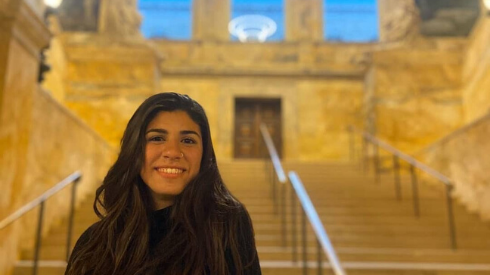Italian student at City College sees life change ‘drastically’ here, at home
As a foreign exchange student, Ludovica Fadini is not allowed to travel home to Italy

Ludovica Fadini, pictured at a library in Boston in January, is a foreign exchange student from Italy at San Diego City College. Ludovica Fadini photo
March 31, 2020
Editor’s note: This is the second in an occasional series of journal entries produced by City Times staff highlighting the impact of the COVID-19 pandemic on members of our community.
In mid-February, about 40,000 people from Bergamo, a quiet and wealthy province in the Lombardy region of northern Italy, traveled 30 miles to Milan to attend a Champions League soccer game.
The matchup was between Atalanta B.C., the home team of Bergamo, and the Spanish team Valencia.
The mayor of Bergamo recently reflected back on that single event, calling it “a strong accelerator of contagion.”
Five weeks later, Bergamo, like much of the entire country of Italy, is completely shut down due to the rapid spread of COVID-19.
There have been nearly 102,000 positive cases in Italy, and 11,591 deaths due to the coronavirus, as of March 30. The majority of those deaths have been in Lombardy.
And Ludovica Fadini is helpless to do anything.
A foreign exchange student at San Diego City College, Fadini is from Milan, far away from her family.
After a conversation with her mother, she was advised to stay. Her mother stressed the fact that the situation in Milan was much different from the one in the U.S.
Although there are more cases of COVID-19 here, the number of deaths is four times higher in Italy.
Bergamo’s hospitals are a source of dread.
One has 500 coronavirus patients and is admitting up to 60 each day. Patients line the corridors.
Inside, the most critical cases are anesthetized and intubated. Some patients wear oxygen-filled helmets to help them breathe. pic.twitter.com/kXykKuzJAk
— The New York Times (@nytimes) March 27, 2020
“I used to talk to my parents a couple of times out of the week,” Fadini said. “Now, I speak to them every day. Sometimes twice a day.”
Even if Fadini wanted to leave, as a foreign exchange student, she is not allowed to travel to Italy for any amount of time. Doing so could jeopardize her the work visa that she is only six college credits away from earning.
But home is definitely where her heart is.
According to media reports, in Bergamo, hospitals are overwhelmed with citizens infected with COVID-19. The elderly are among the masses.
“The majority of the population of Milan are 60 plus years old,” Fadini said.
Doctors and nurses are also being infected while treating the sick. Masks, gloves, and oxygen tanks have become a scarcity since the pandemic started.
Street art in Bergamo pays a touching tribute to overwhelmed medical staff… #coronavirus pic.twitter.com/aK3pavAW8r
— Mark Coleridge (@ArchbishopMark) March 25, 2020
So many people are dying, that the hospital mortuaries and funeral workers have fallen behind. Most of the funeral homes have closed due to sick funeral directors. Some are even in the ICU.
Officials have prohibited changing the clothes of the dead and require people be buried or cremated in the clothing they were wearing when they died. To contain the virus, all religious and civil celebrations are banned in Italy, which includes funerals.
For months, Italian officials had been sending mixed messages about the virus. As a result, many citizens of Italy did not take the virus seriously.
Fadini was one of them.
“When I first heard about the coronavirus, I thought it would disappear as other issues did like the bird flu,” Fadini said. “Then I started to hear cases jump from 50 to 100. That’s when I started to panic.”
Photos from media accounts show neighbors now are locked down and separated from each other, and can only observe from balconies and windows helplessly while sirens echo through the streets.
No citizens are allowed out unless they are going for work, medicine or food.
“A trip to the grocery store could actually end up being a four-hour trip,” Fadini said.
Unlike the U.S, Milan’s coffee shops and restaurants are completely closed. Instead, they cook at home and dine with the family.
“This makes quarantine very hard on my family,” Fadini said. “Being that there’s more than one family in one house sharing the same space, disagreements can turn into serious arguments.”
The sound of harmonic conversation between locals on the street corners has been replaced by stares and silent prayers.
“Milan reminds me of New York,” Fadini said. “That’s why when I see that the streets are empty, it’s scary.”

Here in San Diego, Fadini works as a nanny to two young children, ages 3 and 4. The children’s parents are on the front lines of the coronavirus emergency response.
“Since the coronavirus occurred, my life has changed drastically,” Fadini said. “I used to have lots of time to spend with my friends and take walks on the beach.
“Even my job has become more difficult. I’m now at work every day. Due to the pandemic, all parks, beaches, and attractions have been closed.”
Like the rest of the students at City College, Fadini continues her studies online and has taken up painting as a hobby to take her mind off things.
She hopes the restrictions are lifted soon so she may take a much-needed vacation and her family can return to regular life.
Do you have a unique story to share about how the COVID-19 pandemic has impacted your life? Let us know on social media @SDCityTimes or leave a comment below.










